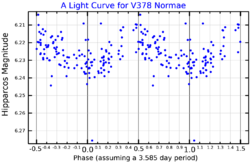Astronomy:V378 Normae
From HandWiki
Short description: Star in the constellation Norma
| Observation data Equinox J2000.0]] (ICRS) | |
|---|---|
| Constellation | Norma |
| Right ascension | 16h 29m 45.2207s[2] |
| Declination | −57° 45′ 22.767″[2] |
| Apparent magnitude (V) | 6.21 - 6.23[3] |
| Characteristics | |
| Spectral type | G8Ib[4] |
| Variable type | Cepheid[3] |
| Astrometry | |
| Radial velocity (Rv) | 5.93±0.15[2] km/s |
| Proper motion (μ) | RA: −1.666[2] mas/yr Dec.: −2.559[2] mas/yr |
| Parallax (π) | 1.0264 ± 0.0349[2] mas |
| Distance | 3,200 ± 100 ly (970 ± 30 pc) |
| Absolute magnitude (MV) | −0.078[5] |
| Details | |
| Mass | 3.43[6] M☉ |
| Radius | 115[7] R☉ |
| Luminosity | 4,214[7] L☉ |
| Surface gravity (log g) | 0.72[6] cgs |
| Temperature | 4,335[7] K |
| Metallicity [Fe/H] | −0.25[6] dex |
| Other designations | |
| Database references | |
| SIMBAD | data |
V378 Normae (also known as HR 6120) is a very luminous supergiant type star in the constellation Norma.[8] It is a likely Cepheid variable with a range of 6.21 to 6.23 and a period of 3.5850 days.[3]
References
- ↑ "Hipparcos Tools Interactive Data Access". ESA. https://www.cosmos.esa.int/web/hipparcos/interactive-data-access.
- ↑ 2.0 2.1 2.2 2.3 2.4 2.5 Vallenari, A. et al. (2022). "Gaia Data Release 3. Summary of the content and survey properties". Astronomy & Astrophysics. doi:10.1051/0004-6361/202243940 Gaia DR3 record for this source at VizieR.
- ↑ 3.0 3.1 3.2 Watson, Christopher (4 January 2010). "V378 Normae". AAVSO Website. American Association of Variable Star Observers. http://www.aavso.org/vsx/index.php?view=detail.top&oid=20338.
- ↑ "V378 Normae, HD148218, HIP80788" (in en). https://www.universeguide.com/star/v378normae.
- ↑ Gontcharov, G. A. (2011). "The red giant branch in the Tycho-2 catalogue". Astronomy Letters 37 (10): 707–717. doi:10.1134/S1063773711090040. Bibcode: 2011AstL...37..707G.
- ↑ 6.0 6.1 6.2 Anders, F.; Khalatyan, A.; Chiappini, C.; Queiroz, A. B.; Santiago, B. X.; Jordi, C.; Girardi, L.; Brown, A. G. A. et al. (2019-08-01). "Photo-astrometric distances, extinctions, and astrophysical parameters for Gaia DR2 stars brighter than G = 18". Astronomy and Astrophysics 628: A94. doi:10.1051/0004-6361/201935765. ISSN 0004-6361. Bibcode: 2019A&A...628A..94A.
- ↑ 7.0 7.1 7.2 Brown, A. G. A. (August 2018). "Gaia Data Release 2: Summary of the contents and survey properties". Astronomy & Astrophysics 616: A1. doi:10.1051/0004-6361/201833051. Bibcode: 2018A&A...616A...1G. Gaia DR2 record for this source at VizieR.
- ↑ "V378 Normae Star Distance, Colour, Size (Radius) and other Facts" (in en). 2015-01-25. https://www.universeguide.com/star/80788/v378normae.
 |


